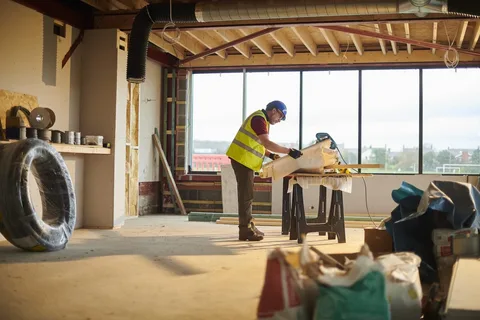Beyond Renovation: Why a Professional Home Addition Contractor is Key to Expanding Your Dream Space
October 28, 2025 | by IoT Development Company

Life changes quickly. A new family member arrives, a career shift requires a dedicated home office, or you simply realize your current floor plan no longer serves your lifestyle. When moving is not an option, the solution lies in expansion—a thoughtfully executed home addition. However, extending your home is a major undertaking that goes far beyond simple renovation; it requires a complex interplay of design, engineering, construction, and compliance. This is where the expertise of a professional Home Addition Contractor becomes absolutely invaluable.
Choosing the right contractor means securing a single point of responsibility for managing this intricate process, ensuring your new space is not just bigger, but seamlessly integrated, structurally sound, and compliant with all local regulations. This article explores the vital role a specialist plays and what you need to know before you break ground.
The Comprehensive Role of a Home Addition Contractor
A professional home addition contractor acts as the general manager of your project, overseeing every phase from the initial concept to the final inspection. Their experience is crucial in anticipating hurdles and streamlining the workflow, ultimately saving you time and preventing costly errors.
Project Management and Coordination
Expanding a home involves numerous skilled trades working simultaneously, a process that must be meticulously managed to stay on schedule and budget.
Scheduling and Trade Integration
The contractor is responsible for coordinating all subcontractors: foundation specialists, framers, electricians, plumbers, HVAC technicians, and roofers. Their job is to ensure these trades work in the correct sequence, avoiding delays and conflicts. A smooth transition from structural framing to mechanical installation is the hallmark of professional project management.
Budget and Timeline Adherence
A skilled contractor provides a detailed, line-item budget and a realistic project timeline, mitigating the risk of unexpected costs. They manage material procurement, anticipating supply chain issues and locking in prices, ensuring the financial scope of work is respected from day one.
Navigating Permitting and Compliance
Building a structural addition requires rigorous compliance with local building codes, zoning laws, and HOA regulations—a labyrinthine process best handled by a seasoned professional.
Design Review and Code Adherence
A top home addition contractor reviews the architectural plans to ensure they meet current safety and structural codes. They understand the specific requirements for foundations, load-bearing walls, insulation, and electrical systems in your locality.
Securing Approvals
The contractor assumes responsibility for submitting all necessary plans and documentation to the municipal building department and managing the inspection process. Their familiarity with the local permitting office often expedites approvals, preventing project stalls that can last weeks or months.
Types of Additions Managed by a Home Addition Contractor
The term “home addition” covers a broad spectrum of projects, each requiring a specialized approach to design and construction. A versatile contractor should have experience across all major categories.
First-Floor and Second-Story Expansions
These are the most common and complex types of additions, fundamentally changing the footprint and vertical structure of your home.
Foundation and Structural Engineering
Adding a new room, whether on the first floor or as a second story, requires careful structural engineering. The existing foundation must be assessed to ensure it can bear the increased load. If a second story is being added, the contractor coordinates with an engineer to reinforce the main-floor framing and footings—a critical step that ensures the home’s long-term safety and integrity.
Seamless Integration and Aesthetic Matching
The contractor’s skill is most visible in the final result: the addition should look like it was always part of the original home. This involves expert matching of roofing materials, siding, trim, and interior finishes so the new space flows naturally from the old.
Specialty and Accessory Dwelling Unit (ADU) Additions
These projects, such as garage conversions or dedicated backyard structures, involve different regulatory and utility challenges.
Utility Extensions and Zoning Specifics
Building an ADU often requires extending water, sewer, and electrical lines independently from the main house. The contractor must navigate zoning rules unique to accessory units, which may dictate size limits, height restrictions, and required setbacks from property lines.
Kitchen and Bathroom Expansions
Adding or expanding wet spaces (kitchens, bathrooms) is complex because it involves intricate coordination between plumbing, waterproofing, ventilation, and electrical systems. The contractor ensures all these elements meet strict health and safety standards.
Selecting Your Home Addition Contractor: Key Criteria
Due diligence is essential when hiring a contractor, as the success of your multi-month project rests on their competence and reliability.
Licensing, Insurance, and Documentation
Verify that your prospective contractor is legally and financially prepared to take on the responsibility of your home.
Verifying Credentials and Guarantees
- State Licensing: Confirm they hold the necessary general contractor license for your state and county. A license confirms their professional competence.
- Liability Insurance and Bonding: Crucially, verify their general liability and workers’ compensation insurance. This protects you financially if a worker is injured on site or if the contractor causes accidental property damage.
Evaluating Experience and Communication
The best predictor of a successful project is a contractor’s proven track record and communication style.
Portfolio and Client References
Ask to see a portfolio that specifically highlights home addition projects—not just kitchen remodels. Speak directly with at least three past clients who had similar-sized additions. Ask them about the contractor’s communication, adherence to the budget, and post-completion follow-up.
Transparency in the Bid Process
A professional contractor provides a detailed, itemized bid that breaks down labor, materials, permits, and contingencies. Be wary of low bids that are vague, as they often lead to high change orders later in the process. The right contractor will also discuss potential contingency budgets for unforeseen issues like hidden structural damage discovered during demolition.
Conclusion
Embarking on a home addition is one of the biggest investments a homeowner can make. It requires precision, complex coordination, and deep knowledge of building science and local law. By partnering with a qualified home addition contractor, you secure not just a builder, but an expert project manager dedicated to making your expanded home structurally sound, aesthetically cohesive, and completed on time and budget. Choose wisely, and watch your dream space seamlessly become a reality.
RELATED POSTS
View all



